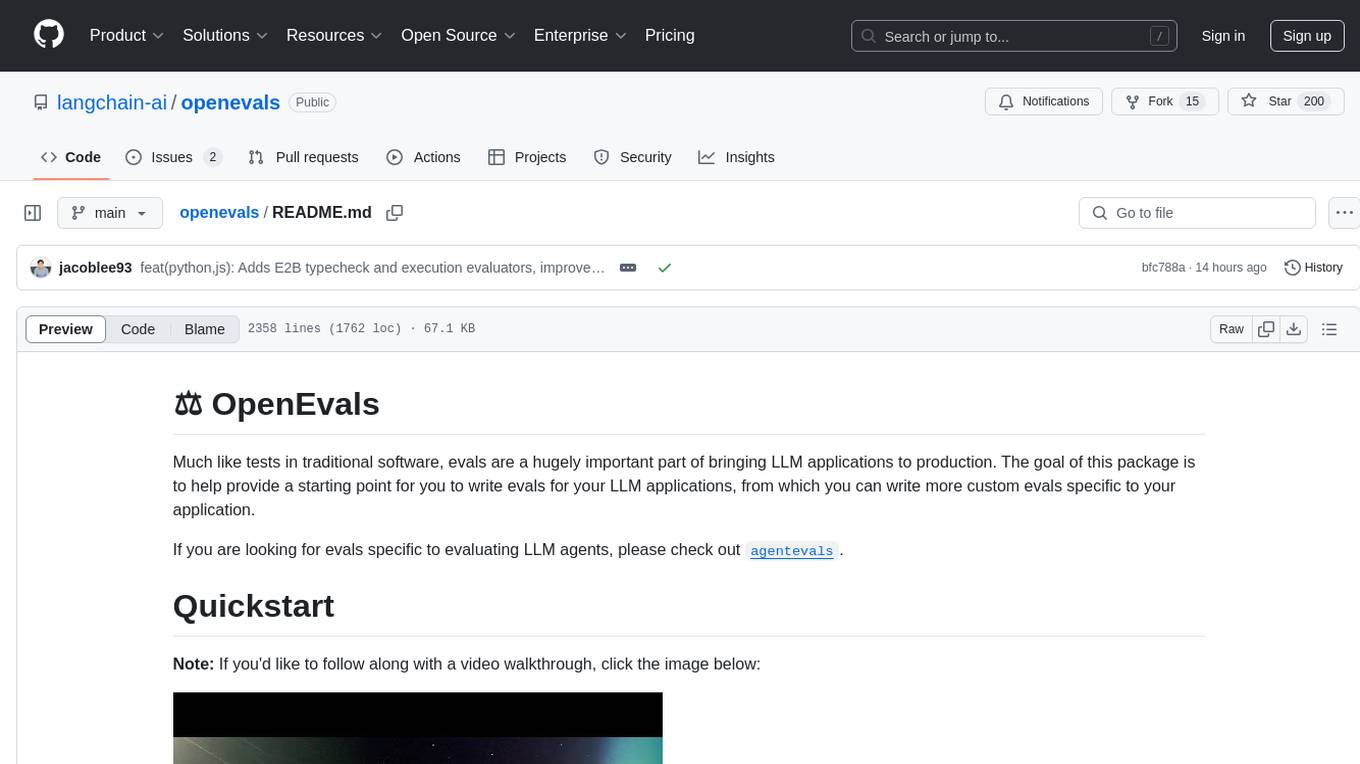
godot-llm
LLM in Godot
Stars: 80
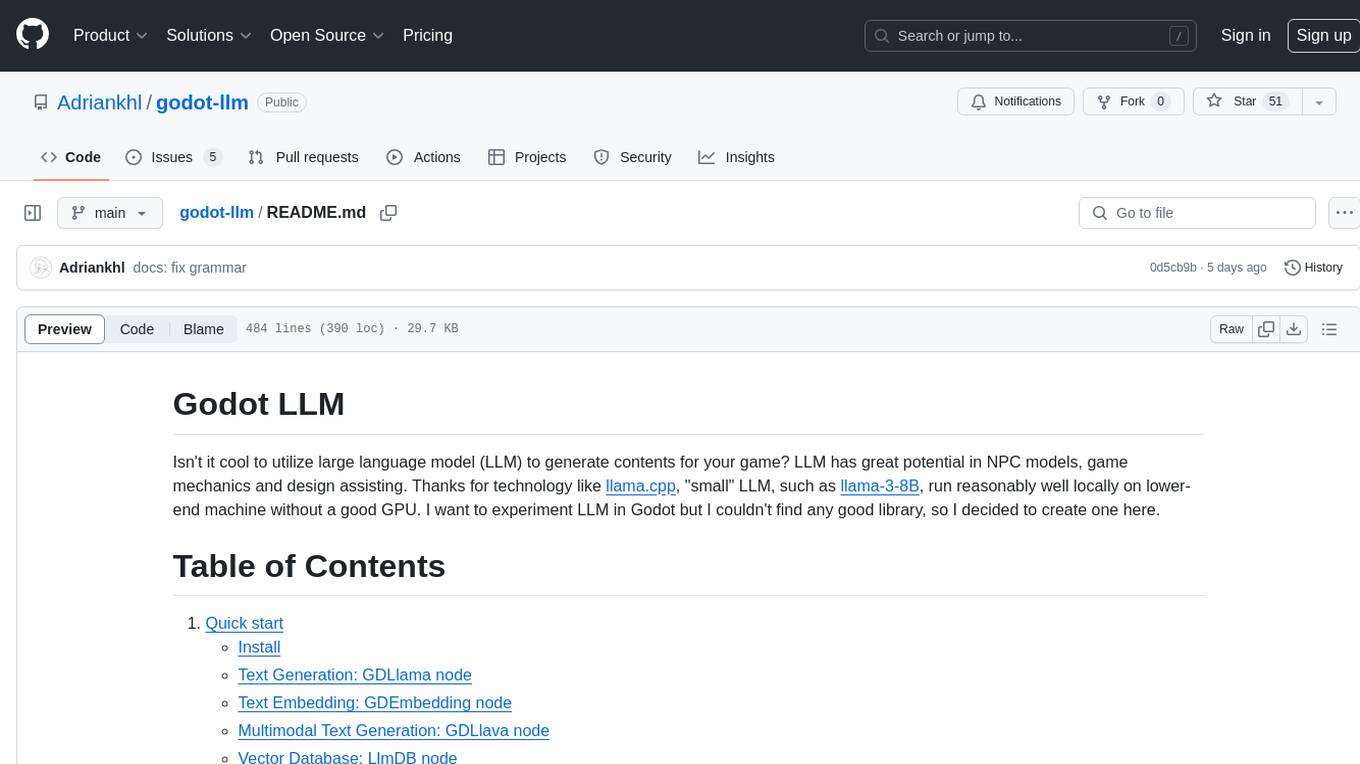
Godot LLM is a plugin that enables the utilization of large language models (LLM) for generating content in games. It provides functionality for text generation, text embedding, multimodal text generation, and vector database management within the Godot game engine. The plugin supports features like Retrieval Augmented Generation (RAG) and integrates llama.cpp-based functionalities for text generation, embedding, and multimodal capabilities. It offers support for various platforms and allows users to experiment with LLM models in their game development projects.
README:
Isn't it cool to utilize large language model (LLM) to generate contents for your game? LLM has great potential in NPC models, game mechanics and design assisting. Thanks for technology like llama.cpp, "small" LLM, such as llama-3-8B, run reasonably well locally on lower-end machine without a good GPU. I want to experiment LLM in Godot but I couldn't find any good library, so I decided to create one here.
⚠ While LLM is less controversial than image generation models, there can still be legal issues when LLM contents are integrated in games, I have created another page to document some relevant information
- Get
Godot LLMdirectly from the asset library, or download the vulkan or cpu zip file from the release page, and unzip it to place it in theaddonsfolder in your godot project - Now you should be able to see
GdLlama,GdEmbedding,GDLlava, andLlmDBnodes in your godot editor. You can add them to a scene in Godot editor, or initialize themm directly by.new().
- Download a supported LLM model in GGUF format (recommendation: Meta-Llama-3-8B-Instruct-Q5_K_M.gguf), move the file to somewhere in your godot project
- Set up your model with GDScript, point
model_pathto your GGUF file. The defaultn_predict = -1generates an infinite sequence, we want it to be shorter here
func _ready():
var gdllama = GDLlama.new()
gdllama.model_path = "./models/Meta-Llama-3-8B-Instruct.Q5_K_M.gguf" ##Your model path
gdllama.n_predict = 20
- Generate text starting from "Hello"
var generated_text = gdllama.generate_text_simple("Hello")
print(generated_text)
- Text generation is slow, you may want to call
gdllama.run_generate_text("Hello", "", "")to run the generation in background, then handle thegenerate_text_updatedorgenerate_text_finishedsignals
gdllama.generate_text_updated.connect(_on_gdllama_updated)
gdllama.run_generate_text("Hello", "", "")
func _on_gdllama_updated(new_text: String):
print(new_text)
- Download a supported embedding model in GGUF format (recommendation: mxbai-embed-large-v1.Q5_K_M.gguf), move the file to somewhere in your godot project
- Set up your model with GDScript, point
model_pathto your GGUF file
func _ready():
var gdembedding= GDEmbedding.new()
gdembedding.model_path = "./models/mxbai-embed-large-v1.Q5_K_M.gguf"
- Compute the embedded vector of "Hello world" in PackedFloat32Array
var array: PackedFloat32Array = gdembedding.compute_embedding("Hello world")
print(array)
- Compute the similarity between "Hello" and "World"
var similarity: float = gdembedding.similarity_cos_string("Hello", "World")
print(similarity)
- Embedding computation can be slow, you may want to call
gdembedding.run_compute_embedding("Hello world")orgdembedding.run_similarity_cos_string("Hello", "Worlld")to run the computation in background, then handle thecompute_embedding_finishedandsimilarity_cos_string_finishedsignals
gdembedding.compute_embedding_finished.connect(_on_embedding_finished)
gdembedding.run_compute_embedding("Hello world")
func _on_embedding_finished(embedding: PackedFloat32Array):
print(embedding)
gdembedding.similarity_cos_string_finished.connect(_on_embedding_finished)
gdembedding.run_similarity_cos_string("Hello", "Worlld")
func _on_similarity_finished(similarity: float):
print(similarity)
Note that the current implementation only allows one thread running per node, avoid calling 2 run_* methods consecutively:
## Don't do this, this will hang your UI
gdembedding.run_compute_embedding("Hello world")
gdembedding.run_similarity_cos_string("Hello", "Worlld")
Instead, always wait for the finished signal or check gdembedding.is_running() before calling a run_* function.
- Download a supported multimodal model in GGUF format (recommendation: llava-phi-3-mini-int4.gguf), be aware that there are two files needed - a
gguflanguage model and a mmproj model (typical name*mmproj*.gguf), move the files to somewhere in your godot project - Set up your model with GDScript, point
model_pathandmmproj_pathto your corresponding GGUF files
func _ready():
var gdllava = GDLlava.new()
gdllava.model_path = "./models/llava-phi-3-mini-int4.gguf"
gdllava.mmproj_path = "./models/llava-phi-3-mini-mmproj-f16.gguf"
- Load an image (
svg,png, orjpg, other format may also works as long as it is supported by Godot), or use your game screen (viewport) as a image
var image = Image.new()
image.load("icon.svg")
## Or load the game screen instead
#var image = get_viewport().get_texture().get_image()
- Generate text to provide "Provide a full description" for the image
var generated_text = gdllava.generate_text_image("Provide a full description", image)
print(generated_text)
- Text generation is slow, you may want to call
gdllama.run_generate_text("Hello", "", "")to run the generation in background, then handle thegenerate_text_updatedorgenerate_text_finishedsignals
gdllava.generate_text_updated.connect(_on_gdllava_updated)
gdllava.run_generate_text_image("Provide a full description", image)
func _on_gdllava_updated(new_text: String):
print(new_text)
- LlmDB node extends GDEmbedding node, follow the previous section to download a model and set up the
model_path
func _ready():
var db = LlmDB.new()
db.model_path = "./models/mxbai-embed-large-v1.Q5_K_M.gguf"
- Open a database, which creates a
llm.dbfile and connect to it by default
db.open_db()
- Set up the structure of the metadata of your textual data, the first metadata should always be an
idfield withStringas the data type, here we use theLlmDBMetaData.create_text,LlmDBMetaData.create_int, andLlmDBMetaData.create_realfunctions to define the structure of metadata with the corresponding data type.
db.meta = [
LlmDBMetaData.create_text("id"),
LlmDBMetaData.create_int("year"),
LlmDBMetaData.create_real("attack")
]
- Different models create embedding vectors of different sizes, calibrate the
embedding_sizeproperty before creating tables
db.calibrate_embedding_size()
- Create tables based on the metadata, By default, these table are created:
-
llm_table_meta: which store the metadata for a particular id -
llm_table: store texts with metadata and embedding - Some tables with names containing
llm_table_virtual: tables for embedding similarity computation
Note that your .meta property should always match the metadata columns in the database before any storing or retrieving operation, consider setting your .meta property within the _ready() function or within the inspector.
db.create_llm_tables()
- Store a piece of text with metadata dictionary specifying the
year, note that you can leave out some of the metadata if it is not relevant to the text. If the input text is longer thanchunk_size, the function will automatically break it down into smaller pieces to fit in thechunk_size.
var text = "Godot is financially supported by the Godot Foundation, a non-profit organization formed on August 23rd, 2022 via the KVK (number 87351919) in the Netherlands. The Godot Foundation is responsible for managing donations made to Godot and ensuring that such donations are used to enhance Godot. The Godot Foundation is a legally independent organization and does not own Godot. In the past, the Godot existed as a member project of the Software Freedom Conservancy."
db.store_text_by_meta({"year": 2024}, text)
- Retrieve 3 of the most similar text chunks to
godotwhere the year is 2024:
print(db.retrieve_similar_texts("godot", "year=2024", 3))
- Depending on the embedding model, storing and retrieving can be slow, consider using the
run_store_text_by_metafunction,run_retrieve_similar_textsfunction, and theretrieve_similar_text_finishedsignal to store and retrieve texts in background. Also, callclose_db()when the database is no longer in use.
The godot-llm-template provides a rather complete demonstration on different functionalities of this plugin
This plugin now has all the essentaial components for simple Retrieval-Augmented Generation (RAG). You can store information about your game world or your character into the vector database, retrieve relevant texts to enrich your prompt, then generate text for your game, the generated text can be stored back to the vector database to enrich future prompt. RAG complement the shortcoming of LLM - the limited context size force the model to forget earlier information, and with RAG, information can be stored in a database to become long-term memory, and only relevant information are retrieve to enrich the prompt to keep the prompt within the context size.
To get started, you may try the following format for your prompt input:
Document:
{retrieved text}
Question:
{your prompt}
- Platform (backend): windows (cpu, vulkan), macOS(cpu, metal), Linux (cpu, vulkan), Android (cpu)
- macOS support is on best effort basis since I don't have a mac myself
-
llama.cpp-based features
- Text generation
- Embedding
- Multimodal
- Vector database integration based on sqlite and sqlite-vec
- Split text to chunks
- Store text embedding
- Associate metadata with text
- Retrieve text by embedding similarity and sql constraints on metadata
- iOS: build should be trivial, but an apple developer ID is needed to run thhe build
- Add in-editor documentation, waiting for proper support in Godot 4.3
- Add utility functions to generate useful prompts, such as llama guard 2
- Download models directly from huggingface
- Automatically generate json schema from data classes in GDSCript
- More llama.cpp features
- mlc-llm integration
- Any suggestion?
There are 3 base nodes added by this plugin: GdLlama, GdEmbedding, and GdLlava.
Each type of node owns a set of properties which affect the computational performance and the generated output. Some of the properties belong to more than one node, and they generally have similar meaning for all types of node.
-
Model Path: location of your GGUF model -
Mmproj Pathlocation of yourmmprojGGUF file, forGdLlavaonly -
Instruct: question and answer interactive mode -
Interactive: custom interactive mode, you should set yourreverse_prompt,input_prefix, andinput_suffixto set up a smooth interaction -
Reverse Prompt: AI stops to wait for user input after seeing this prompt being generated, a good example is "User:" -
Input Prefix: append before every user input -
Input Suffix: append after every user input -
Should Output prompt: whether the input prompt should be included in the output -
Should Output Special: whether the special (e.g., beginning of sequence and ending of sequence) token should be included in the output -
Context Size: number of tokens the model can process at a time -
N Predict: number of new tokens to generate, generate infinite sequence if -1 -
N Keep: when the model run out ofcontext size, it starts to forget about earlier context, set this variable to force the model to keep a number of the earliest tokens to keep the conversation relevant -
Temperature: the higher the temperature, the more random the generated text -
Penalty Repeat: penalize repeated sequence, diabled if -1 -
Penalty Last N: the number of latest token to consider when penalizing repeated sequence, disabled if 0,Context Sizeif -1 -
Penalilze Nl: penallize newline token -
Top K: only sample from this amount of tokens with the highest probabilities, disabled if 0 -
Top P: only sample from tokens within this cumulative probability, disabledd if 1.0 -
Min P: only sample from tokens with at least this probability, disabledd if 0.0 -
N Thread: number of cpu threads to use -
N GPU Layer: number of layer offloaded to GPU -
Main GPU: the main GPU for computation -
Split Mode: how the computation will be distributed if there are multiple GPU in your systemm (0: None, 1: Layer, 2: Row) -
Escape: process escape character in input prompt -
N Batch: maximum number of tokens per iteration during continuous batching -
N Ubatch: maximum batch size for computation
-
generate_text_simple(prompt: String) -> String: generate text from prompt -
generate_text_json(prompt: String, json: String) -> String: generate text in a format enforced by a json schema, see the following section -
generate_text_grammar(prompt: String, grammar: String) -> String: generate text in a format enforced by GBNF grammar -
generate_text(prompt: String, grammar: String, json: String) -> String: a wrapper function, rungenerate_text_grammaifgrammaris non-empty, runsgenerate_text_jsonifjsonis non-empty, rungenerate_text_simpleotherwise -
run_generate_text(prompt: String, grammar: String, json: String) -> Error: rungenerate_textin background, rely on signals to recieve generated text, note that only one background thread is allowd for a GDLlama node, calling this function when the background thread is still running will freeze the logic until the background thread is done -
input_text(input: String): input text to interactively generate text (with eitherInstructorInteractiveenabled) with the model, only works if the model is waiting for intput, inputing an empty string means the model should continue to generate what it has been generating -
stop_generate_text(): stop text generation, clean up the model and the background thread -
is_running() -> bool: whether the background thread is running -
is_waiting_input() -> bool: whether the model is waiting for input text (with eitherInstructorInteractiveenabled)
-
generate_text_finished(text: String): emitted with the full generated text when a text generation is completed. When eitherInstructorInteractiveenabled, this signal is emitted after the whole interaction is finished -
generate_text_updated(new_text: String): instead of waiting the full generated text, this signal is emited whenever a new token (part of the text sequence) is generated, which forms a stream of strings -
input_wait_started(): the model is now starting to wait for user input, happens when eitherInstructorInteractiveare enabled and the model stop generating text in the middle of the conversation to wait for further input from the user.
-
compute_embedding(prompt: String) -> PackedFloat32Array: compute the embedding vector of a prompt -
similarity_cos_array(array1: PackedFloat32Array, array2: PackedFloat32Array) -> float: compute the cosine similarity between two embedding vectors, this is a fast function, no model is loaded -
similarity_cos_string(s1: String, s2: String) -> float: compute the cosine similarity between two strings -
run_compute_embedding(prompt: String) -> Error: runcompute_embedding(prompt: String)in background, rely on thecompute_embedding_finishedsignal to recieve the embedding vector, note that only one background thread is allowd for a GDEmbedding node, calling this function when the background thread is still running will freeze the logic until the background thread is done -
run_similarity_cos_string(s1: String, s2: String) -> Error: runsimilarity_cos_stringin background, rely on thecompute_similairty_finishedsignal to recieve the cosine similairty, note that only one background thread is allowd for a GDEmbedding node, calling this function when the background thread is still running will freeze the logic until the background thread is done -
is_running() -> bool: whether the background thread is running
-
compute_embedding_finished(embedding: PackedFloat32Array): emitted whenrun_compute_embeddingis completed -
similarity_cos_string_finished(similarity: float): emitted whenrun_similarity_cos_stringis completed
-
generate_text_base64(prompt: String, image_base64: String) -> String: generate text based on a prompt and a base64 string which encodes ajpgorpngimage -
generate_text_image(prompt: String, image: Image) -> String: generate text based on a prompt and anImageobject in Godot -
run_generate_text_base64(prompt: String, image_base64: String) -> Error: rungenerate_text_base64in background, rely on signals to recieve generated text, note that only one background thread is allowd for a GDLlava node, calling this function when the background thread is still running will freeze the logic until the background thread is done -
run_generate_text_base64(prompt: String, image: Image) -> Error: rungenerate_text_base64in background, rely on signals to recieve generated text, note that only one background thread is allowd for a GDLlava node, calling this function when the background thread is still running will freeze the logic until the background thread is done -
stop_generate_text(): stop text generation, clean up the model and the background thread -
is_running() -> bool: whether the background thread is running
-
generate_text_finished(text: String): emitted with the full generated text when a text generation is completed -
generate_text_updated(new_text: String): instead of waiting the full generated text, this signal is emited whenever a new token (part of the text sequence) is generated, which forms a stream of strings
Suppose you want to generate a character with:
-
name: a string from 3 character to 20 character -
birthday: a string with a specific date format -
weapon: either "sword", "bow", or "wand -
description: a text with minimum 10 character
You should first create a GDLlama node, and turn Should Output prompt and Should Output Special off either by inspector or by script:
should_output_prompt = false
should_output_special = false
Construct the following _person_schema dictionary in GDScript:
var _person_schema = {
"type": "object",
"properties": {
"name": {
"type": "string",
"minLength": 3,
"maxLength": 20,
},
"birthday": {
"type": "string",
"format": "date"
},
"weapon": {
"enum": ["sword", "bow", "wand"],
},
"description": {
"type": "string",
"minLength": 10,
},
},
"required": ["name", "birthday", "weapon", "description"]
}
Then convert it to a json string
var person_schema: String = JSON.stringify(_person_schema)
Supposed you are interested in a "Main character in a magic world", you can generate the character using the generate_text_json(prompt, json_scheme) of the GDLlama node:
var json_string: String = generate_text_json(prompt, json_scheme)
Note that text generation is slow, you may want to use run_generate_text(prompt, "", json_scheme) to run the generation in background, then handle generate_text_finished to receive the generated text.
json_string should look like this:
{"birthday": "2000-05-12", "description": "A young wizard with a pure heart and a mischievous grin. He has a wild imagination and a love for adventure. He is always up for a challenge and is not afraid to take risks.", "name": "Eryndor Thorne", "weapon": "wand"}
Now, the generated data is ready, you can parse back to a dictionary or other object to use the data.
var dict: Dictionary = {}
var json = JSON.new()
var error = json.parse(json_string)
if (error == OK):
dict = json.data
print(dict["name"]) ##Eryndor Thorne
LlmDB extends GDEmbedding and shares all its properties, check the section above for the relevant information. Additionally, LlmDB has
-
Meta: an array of LlmDBMetaData Resource which defines the structure of the metadata. LlmDBMetaData containsData Namewhich define the name of a metadata, andData Type(0=integer, 1=real, 2=text, 3=blob) to define the data type of the metadata.Metashould be non-empty, and the first element ofMetashould always be anidwith text as theData Type. -
dB Dir: the directory of the database file, default is the root directory of the project -
dB File: the file name of the database file, default isllm.db -
Table Name: defines the name of the tables created by thecreate_llm_tablesfunction -
Embedding Size: the vector size of the embedding computed by the model, used in thecreate_llm_tablesfunction -
Absolute Separators: an array ofString. When storing a piece of text, the text will be first separated by theStringdefines here, the separation process will stop if the separated text is shorter thanChunk Sizeor all the separators here have been processed. The default are\nand\n\n, which are displayed as empty space in the inspector. -
Chunk Separators: an array ofString. After theAbsolute Separatorsare processed, one of the separators (first one that works) here will be chosen to further separated the piece of texts, then the pieces are grouped up to chunks to fulfill the requirements ofChunk SizeandChunk Overlap -
Chunk Size: any text chunk should not exceed this size, unless the separation function fails to fulfill the requirement after iteratoring through the iterators -
Chunk Overlap: the maximum overlap between neighbouring text chunks, the algorithm will try to create the biggest overlap possible fulfilling this constraint
Besides the functions and signals from GDEmbedding, LlmDB has a few more functions and signals
-
calibrate_embedding_size(): calibrateEmbedding Sizeto the correct number based on the model inmodel_path -
open_db(): create adB_FileatdB_Dirif the file doesn't exist, then connect to the database -
close_db(): terminate the connection to the database -
execute(statement: String)execute an sql statement, turn onVerbose stdoutinProject Settingsto see the log generated by this statement -
create_llm_tables(): create a table with nameTable Nameif the table doesn't exist, aTable Name+_metatable to store pre-defined metadata byid, and some_virtualtables to -
drop_table(p_table_name: String): drop a table with a specific name -
drop_llm_tables(p_table_name: String): drop all tables (except thesqlite_sequencetable which is created automatically for autoincrement) created bycreate_llm_tables(), i.e.,p_table_name,p_table_name+_metaand every table with a name containingp_table_name+_virtual -
has_table(p_table_name: String) -> bool: whether a table with this name exists -
is_table_valid(p_table_name: String) -> bool: whether the table contains valid metadata, i.e., all elements in.metaproperties exist in the table and the data types are correct -
store_meta(meta_dict: Dictionary): store a set of meta data to tableTable Name+_metawithidas the primary key, such that you can callstore_text_by_idby id instead of inputting the full metadata dictionary throughstore_text_by_meta -
has_id(id: String, p_table_name: String) -> bool: whether the table has a specific id stored -
split_text(text: String) -> PackedStringArray: split a piece of text first by allAbsolute Separators, then by one of the appropiateChunk Separators, such that any text chunk is shorter thanChunk Size(measured in character), and the overlap is close to but not greater thanChunk Overlap. If the algorithm failed to satisfy the contraints, there will be an error message printed out and the returned chunk will be greater than theChunk Size -
store_text_by_id(id: String, text: String): split the text and store the chunks in the database, be aware thatstore_metashould have been called previously such that theidwith the corresponding meta is already in the database -
run_store_text_by_id(id: String, text: String) -> Error: runstore_text_by_idin background, emitsstore_text_finishedsignal when finished -
store_text_by_meta(meta_dict: Dictionary, text: String): split the text and store the chunks in the database with the metadata defined inmeta_dict, be aware that the metadata should be valid, every key should be a name stored in the.metaproperty and the corresponding type should be correct -
run_store_text_by_meta(meta_dict: Dictionary, text: String) -> Errorrunstore_text_by_metain background, emitsstore_text_finishedsignal when finished -
retrieve_similar_texts(text: String, where: String, n_results: int) -> PackedStringArray: retrieven_resultsmost similar text chunks totext,whereshould be empty or an sql WHERE clause to filter the chunks by metadata -
run_retrieve_similar_texts(text: String, where: String, n_results: int) -> Error: runretrieve_similar_textsin background, and emits aretrieve_similar_texts_finishedsignal once it is done
-
store_text_finished: emitted whenrun_store_text_by_idorrun_store_text_by_metais finished -
retrieve_similar_texts_finished(array: PackedStringArray): contains an array ofString, emitted whenrun_retrieve_similar_textsis finished
This is a simple resource class that forms the meta array property in LlmDB. It has two properties:
-
data_name: aStringthat defines the name of this metadata -
data_type: anintthat defines the data type of this metadata (0=integer, 1=real, 2=text, 3=blob), note that inputing an integer here is not recommended since it can be confusing, use the inspector properties, the LlmDBMetaData enum or the function below instead -
LlmDBMetaDataTypeenum:LlmDBMetaData.INTEGER = 0LlmDBMetaData.REAL = 1LlmDBMetaData.TEXT = 2LlmDBMetaData.BLOB = 3
There are 4 static functions to create LlmDBMetaData
-
create_int(data_name: String) -> LlmDBMetaData: create a LlmDBMetaData with type int (0) -
create_real(data_name: String) -> LlmDBMetaData: create a LlmDBMetaData with type real (1) -
create_text(data_name: String) -> LlmDBMetaData: create a LlmDBMetaData with type text (2) -
create_blob(data_name: String) -> LlmDBMetaData: create a LlmDBMetaData with type blob (3), note that blob data type support is still a work-in-progress
Alternatively, you can use this static function to create LlmDBMetaData
-
create(data_name: String, data_type: int) -> LlmDBMetaData: create a corresponding LlmDBMetaData bydata_nameanddata_type, it is recommended to use the enum instead ofintfordata_type
- How to get more debug message?
Turn on Verbose stdout in Project Settings, consider running Godot from a terminal to get additional logging messages.
- Does it support languages other than English?
Yes, the plugin uses utf8 encoding so it has multilingual support naturally. However, a language model may be trained with English data only and it won't be able to generate text other than English, choose the language model based on your need.
- Strange tokens in generated text, such as
<eot_id>whenShould Output Specialis off.
You are always welcome to open an issue. However, be aware that the standard of GGUF format can be changed to support new features and models, such that the bug can come from the model side instead of within this plugin. For example, some older llama 3 GGUF model may not be compatible with the latest format, you may try to search for a newer model with fixes such as this.
- You are running Arch linux (or its derivatives such as Manjaro) and your Godot Editor crash.
The Arch build of Godot is bugged when working with GDExtension, download Godot from the official website instead.
- You have a discrete GPU and you see
unable to load modelerror, you have make sure that the model parameters are correctly set.
There is currently a bug on vulkan backend if you have multiple drivers installed for the same GPU, try to turn Split Mode to NONE (0) and set your Main GPU manually (starting from 0) to see if it works.
Install build tools and Vulkan SDK for your operating system, then clone this repository
git clone https://github.com/Adriankhl/godot-llm.git
cd godot-llm
git submodule update --init --recursive
mkdir build
cd build
Run cmake.
On Windows:
cmake .. -GNinja -DCMAKE_C_COMPILER=clang-cl -DCMAKE_CXX_COMPILER=clang-cl -DLLAMA_NATIVE=OFF -DLLAMA_VULKAN=ON -DCMAKE_EXPORT_COMPILE_COMMANDS=1 -DCMAKE_BUILD_TYPE=Release
On Linux:
cmake .. -GNinja -DLLAMA_NATIVE=OFF -DCMAKE_EXPORT_COMPILE_COMMANDS=1 -DLLAMA_VULKAN=ON -DCMAKE_BUILD_TYPE=Release
Vulkan build works for Windows and Linux, if you want a cpu build, set -DLLAMA_VULKAN=OFF instead.
For Android, set $NDK_PATH to your android ndk directory, then:
cmake .. -GNinja -DCMAKE_TOOLCHAIN_FILE=$NDK_PATH\cmake\android.toolchain.cmake -DANDROID_ABI=arm64-v8a -DANDROID_PLATFORM=android-23 -DCMAKE_C_FLAGS="-mcpu=generic" -DCMAKE_CXX_FLAGS="-mcpu=generic" -DCMAKE_BUILD_TYPE=Release
You may want to adjust the compile flags for Android to suit different types of CPU.
Then compile and install by ninja:
ninja -j4
ninja install
The folder ../install/gpu/addons/godot_llm (cpu instead of gpu for cpu build) can be copy directly to the addons folder of your godot project.
- PRs are welcome
For Tasks:
Click tags to check more tools for each tasksFor Jobs:
Alternative AI tools for godot-llm
Similar Open Source Tools

godot-llm
Godot LLM is a plugin that enables the utilization of large language models (LLM) for generating content in games. It provides functionality for text generation, text embedding, multimodal text generation, and vector database management within the Godot game engine. The plugin supports features like Retrieval Augmented Generation (RAG) and integrates llama.cpp-based functionalities for text generation, embedding, and multimodal capabilities. It offers support for various platforms and allows users to experiment with LLM models in their game development projects.
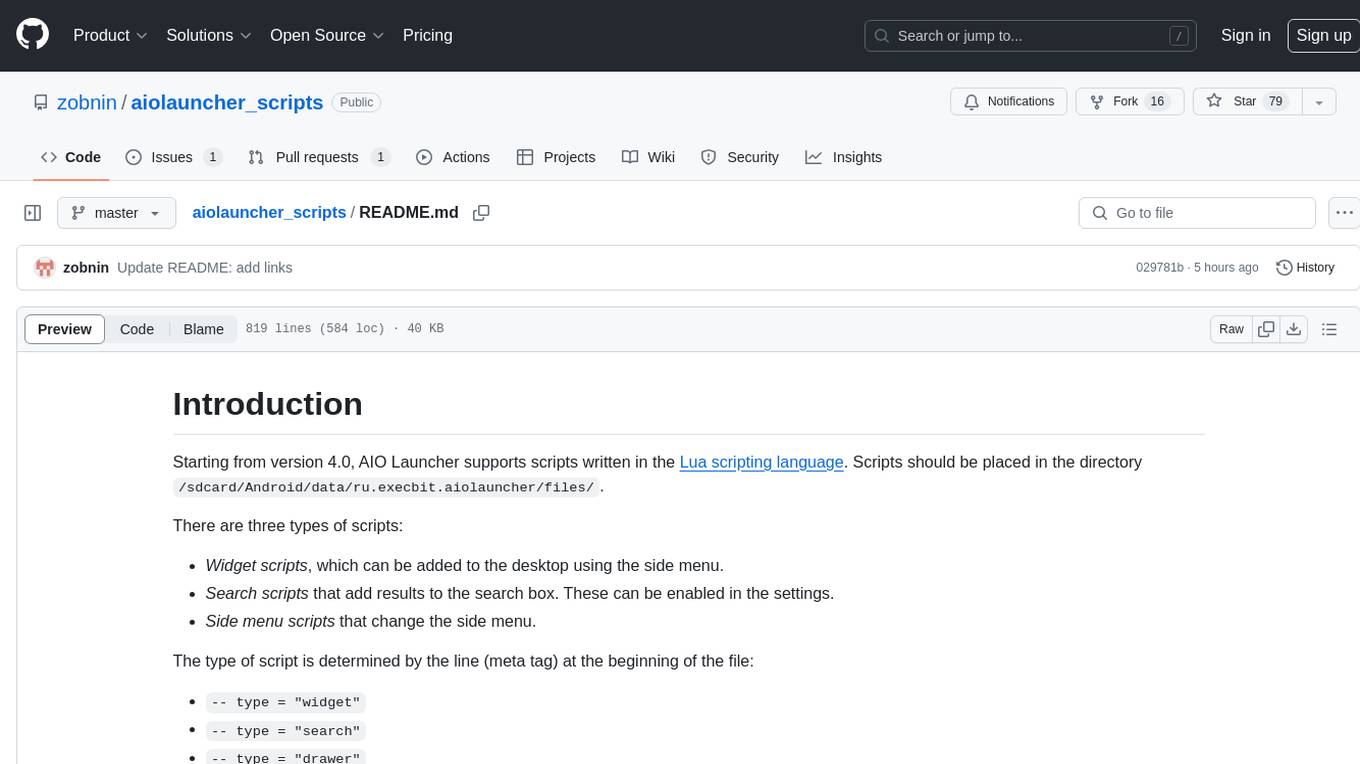
aiolauncher_scripts
AIO Launcher Scripts is a collection of Lua scripts that can be used with AIO Launcher to enhance its functionality. These scripts can be used to create widget scripts, search scripts, and side menu scripts. They provide various functions such as displaying text, buttons, progress bars, charts, and interacting with app widgets. The scripts can be used to customize the appearance and behavior of the launcher, add new features, and interact with external services.
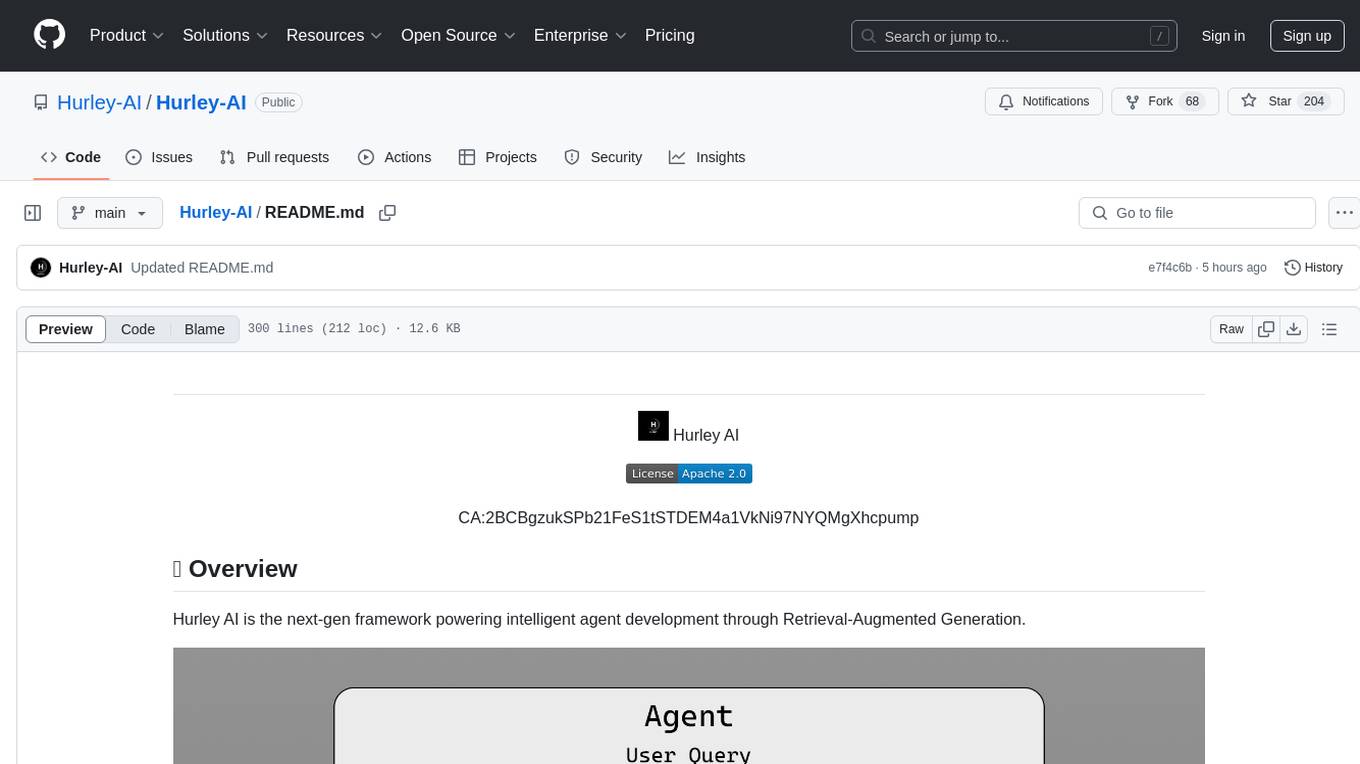
Hurley-AI
Hurley AI is a next-gen framework for developing intelligent agents through Retrieval-Augmented Generation. It enables easy creation of custom AI assistants and agents, supports various agent types, and includes pre-built tools for domains like finance and legal. Hurley AI integrates with LLM inference services and provides observability with Arize Phoenix. Users can create Hurley RAG tools with a single line of code and customize agents with specific instructions. The tool also offers various helper functions to connect with Hurley RAG and search tools, along with pre-built tools for tasks like summarizing text, rephrasing text, understanding memecoins, and querying databases.
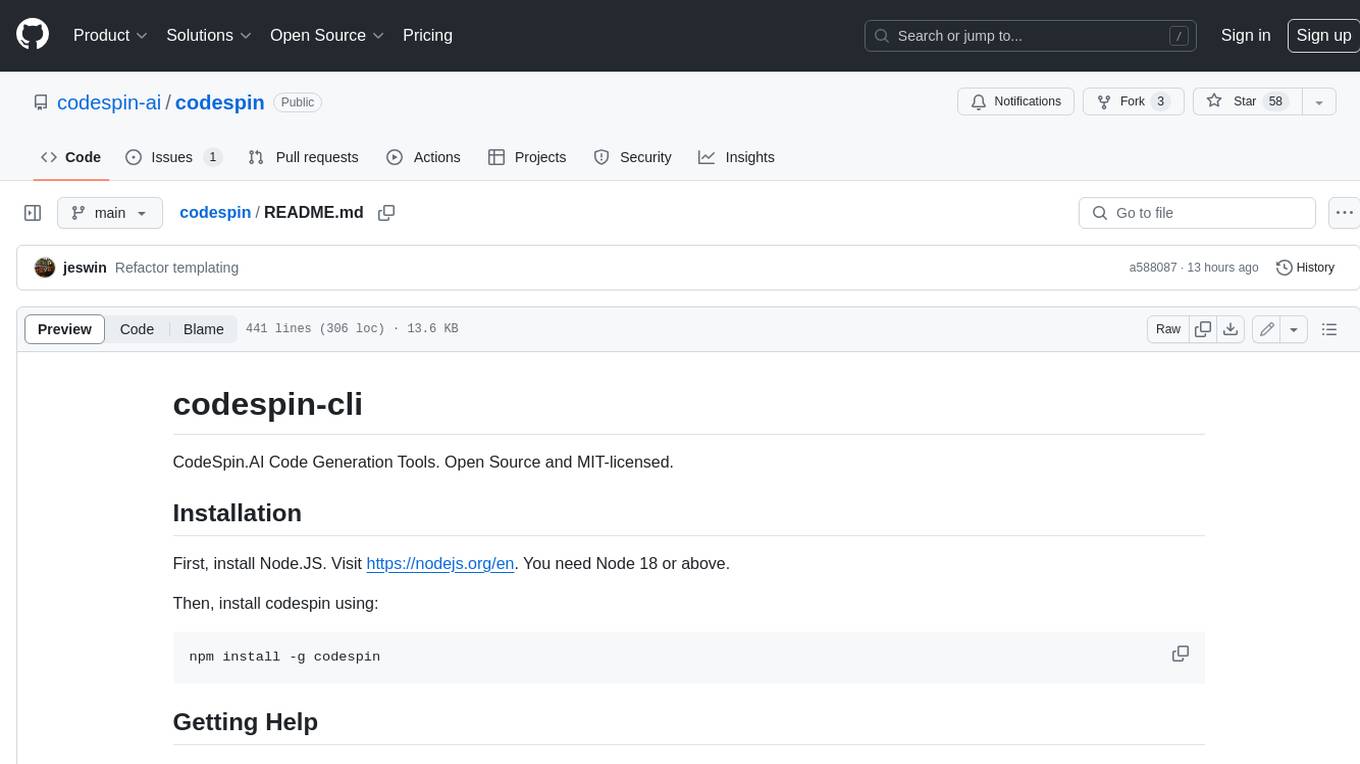
codespin
CodeSpin.AI is a set of open-source code generation tools that leverage large language models (LLMs) to automate coding tasks. With CodeSpin, you can generate code in various programming languages, including Python, JavaScript, Java, and C++, by providing natural language prompts. CodeSpin offers a range of features to enhance code generation, such as custom templates, inline prompting, and the ability to use ChatGPT as an alternative to API keys. Additionally, CodeSpin provides options for regenerating code, executing code in prompt files, and piping data into the LLM for processing. By utilizing CodeSpin, developers can save time and effort in coding tasks, improve code quality, and explore new possibilities in code generation.
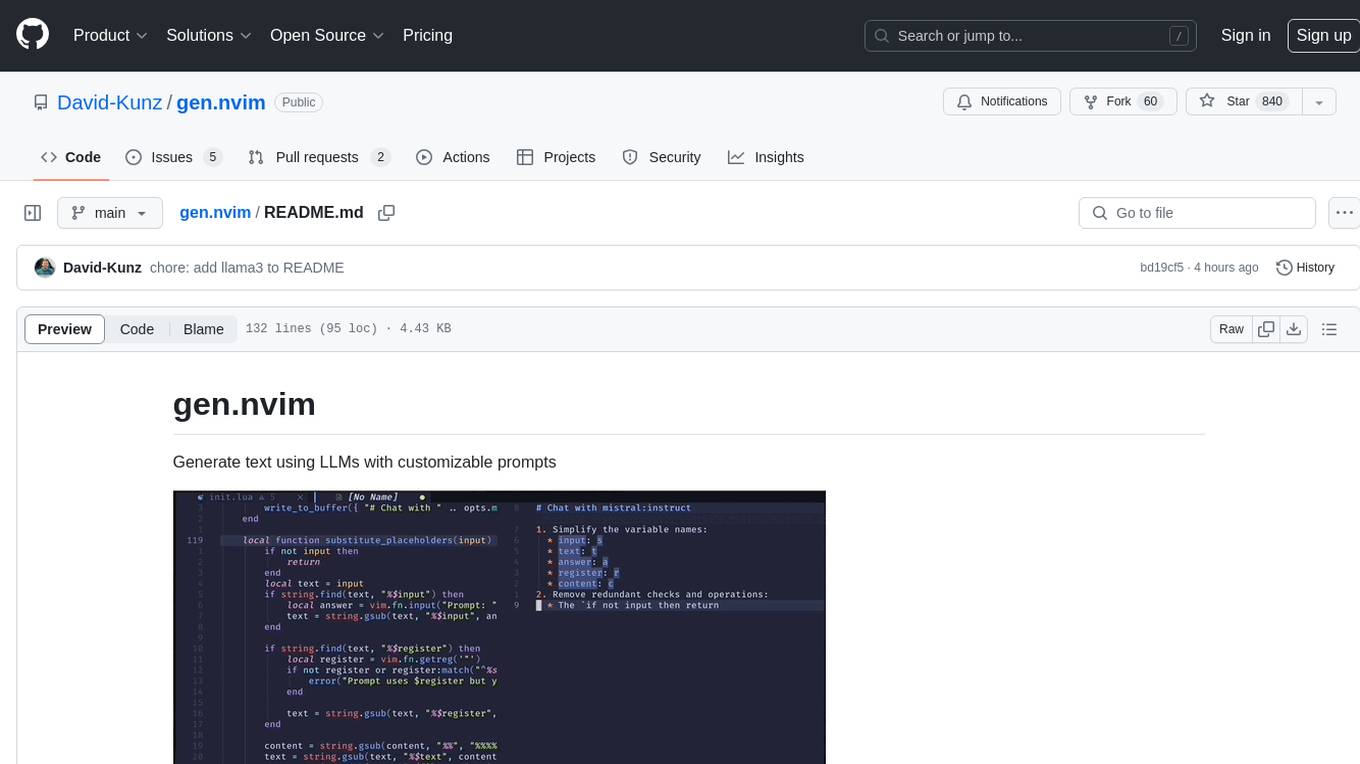
gen.nvim
gen.nvim is a tool that allows users to generate text using Language Models (LLMs) with customizable prompts. It requires Ollama with models like `llama3`, `mistral`, or `zephyr`, along with Curl for installation. Users can use the `Gen` command to generate text based on predefined or custom prompts. The tool provides key maps for easy invocation and allows for follow-up questions during conversations. Additionally, users can select a model from a list of installed models and customize prompts as needed.
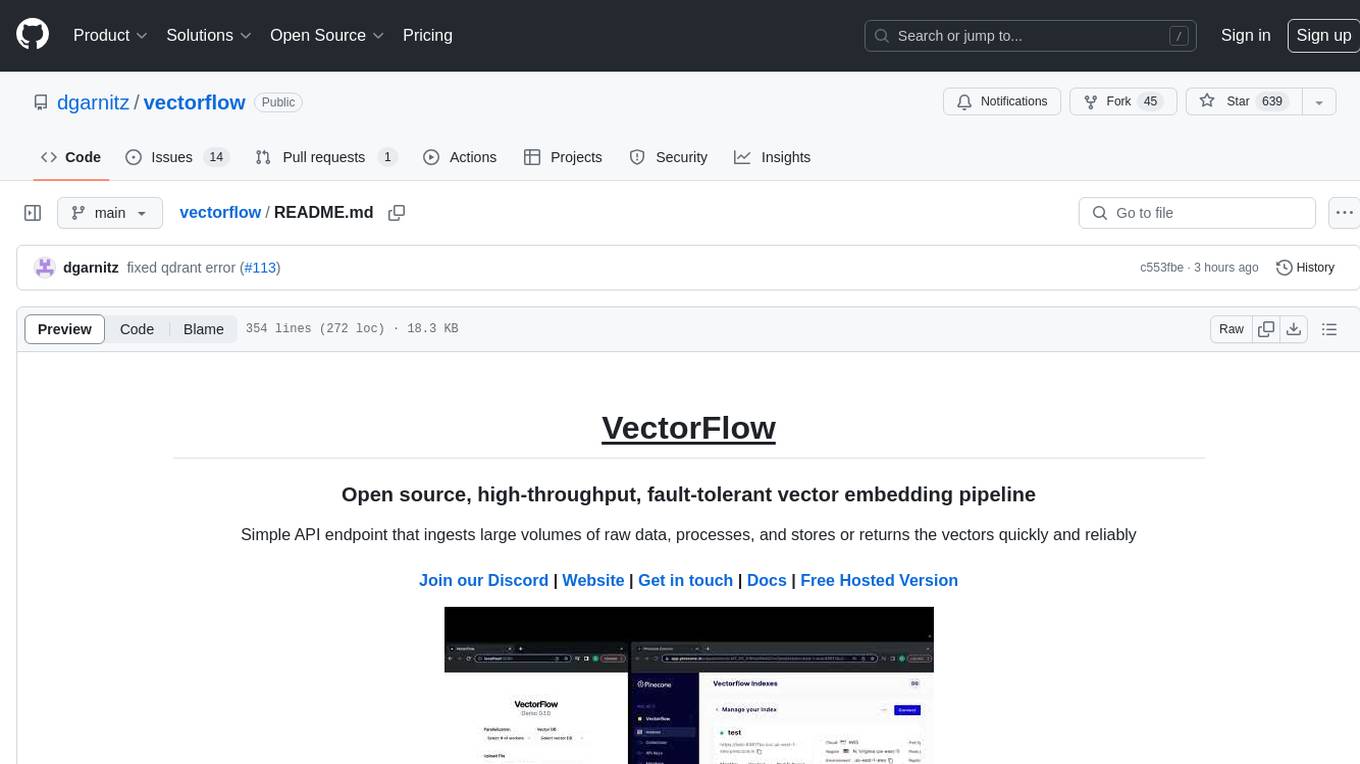
vectorflow
VectorFlow is an open source, high throughput, fault tolerant vector embedding pipeline. It provides a simple API endpoint for ingesting large volumes of raw data, processing, and storing or returning the vectors quickly and reliably. The tool supports text-based files like TXT, PDF, HTML, and DOCX, and can be run locally with Kubernetes in production. VectorFlow offers functionalities like embedding documents, running chunking schemas, custom chunking, and integrating with vector databases like Pinecone, Qdrant, and Weaviate. It enforces a standardized schema for uploading data to a vector store and supports features like raw embeddings webhook, chunk validation webhook, S3 endpoint, and telemetry. The tool can be used with the Python client and provides detailed instructions for running and testing the functionalities.
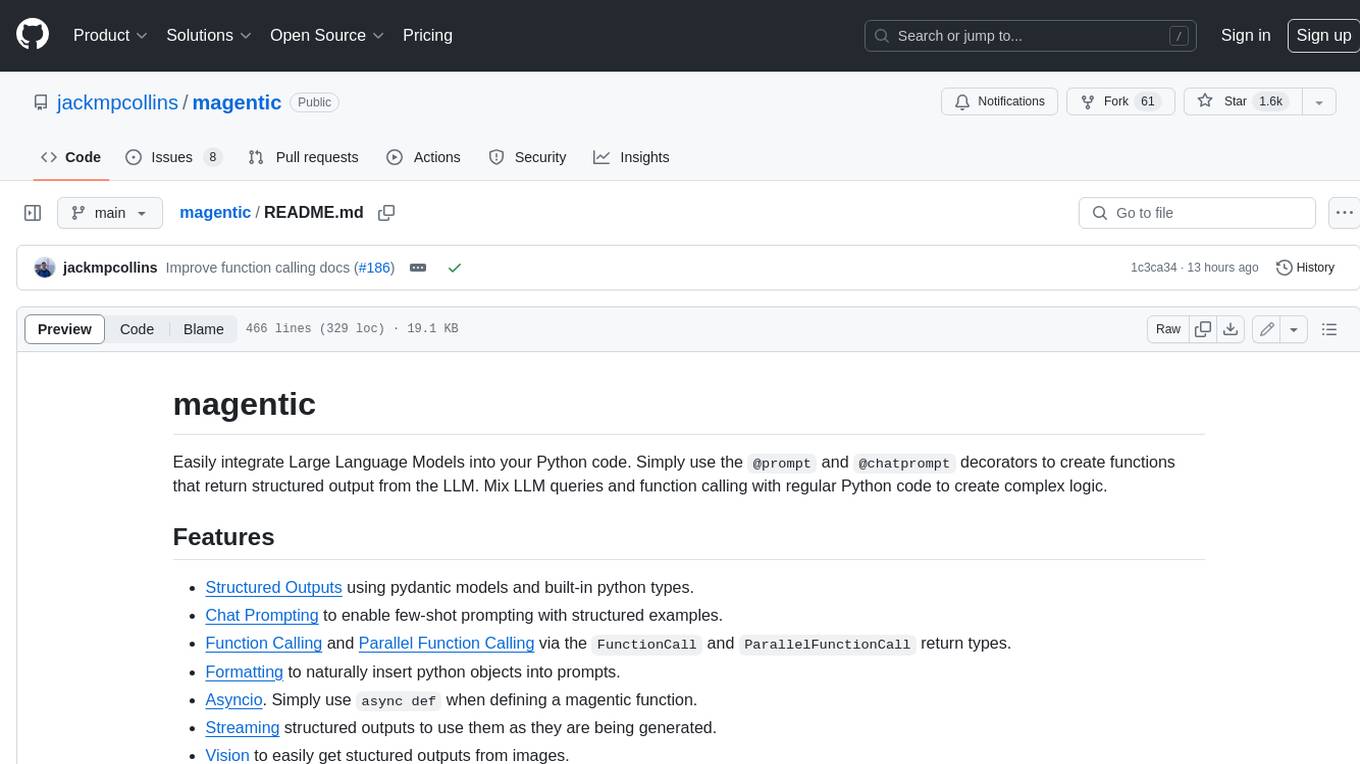
magentic
Easily integrate Large Language Models into your Python code. Simply use the `@prompt` and `@chatprompt` decorators to create functions that return structured output from the LLM. Mix LLM queries and function calling with regular Python code to create complex logic.
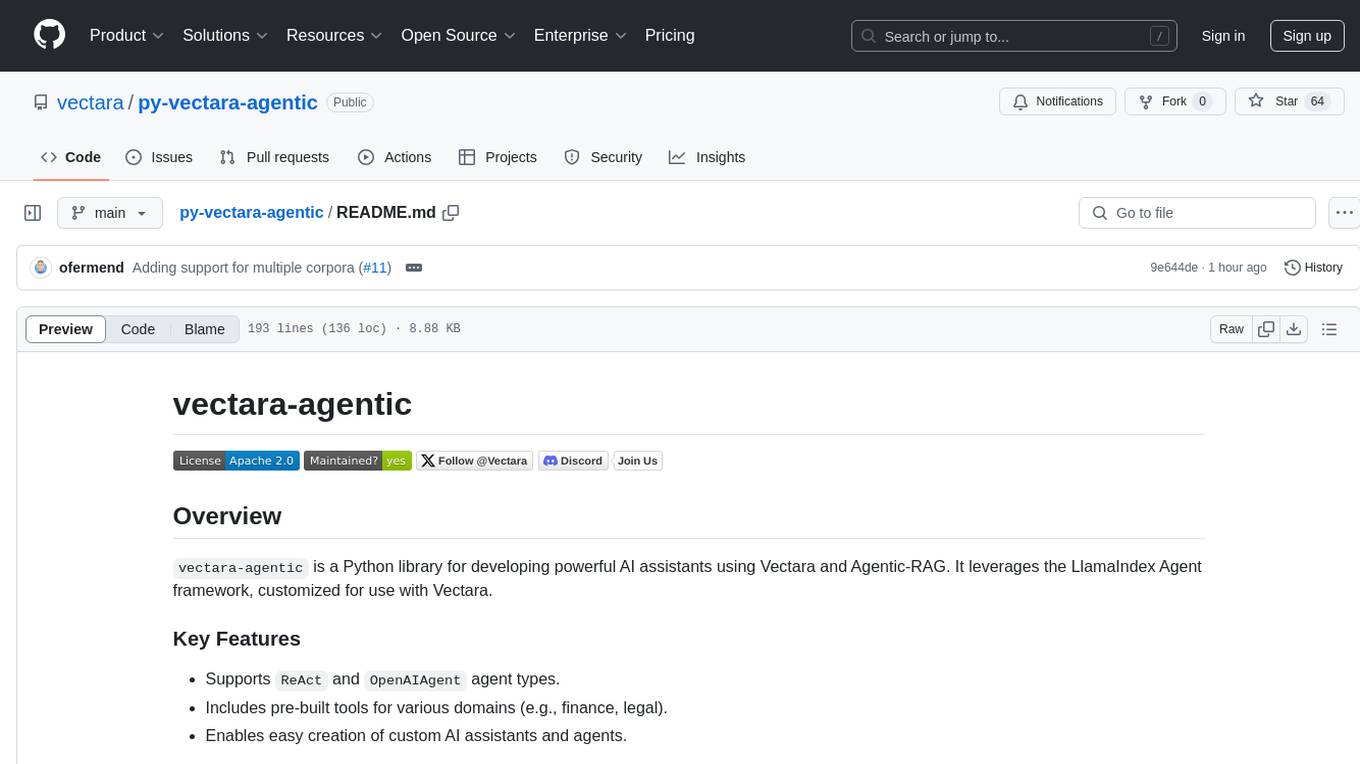
py-vectara-agentic
The `vectara-agentic` Python library is designed for developing powerful AI assistants using Vectara and Agentic-RAG. It supports various agent types, includes pre-built tools for domains like finance and legal, and enables easy creation of custom AI assistants and agents. The library provides tools for summarizing text, rephrasing text, legal tasks like summarizing legal text and critiquing as a judge, financial tasks like analyzing balance sheets and income statements, and database tools for inspecting and querying databases. It also supports observability via LlamaIndex and Arize Phoenix integration.
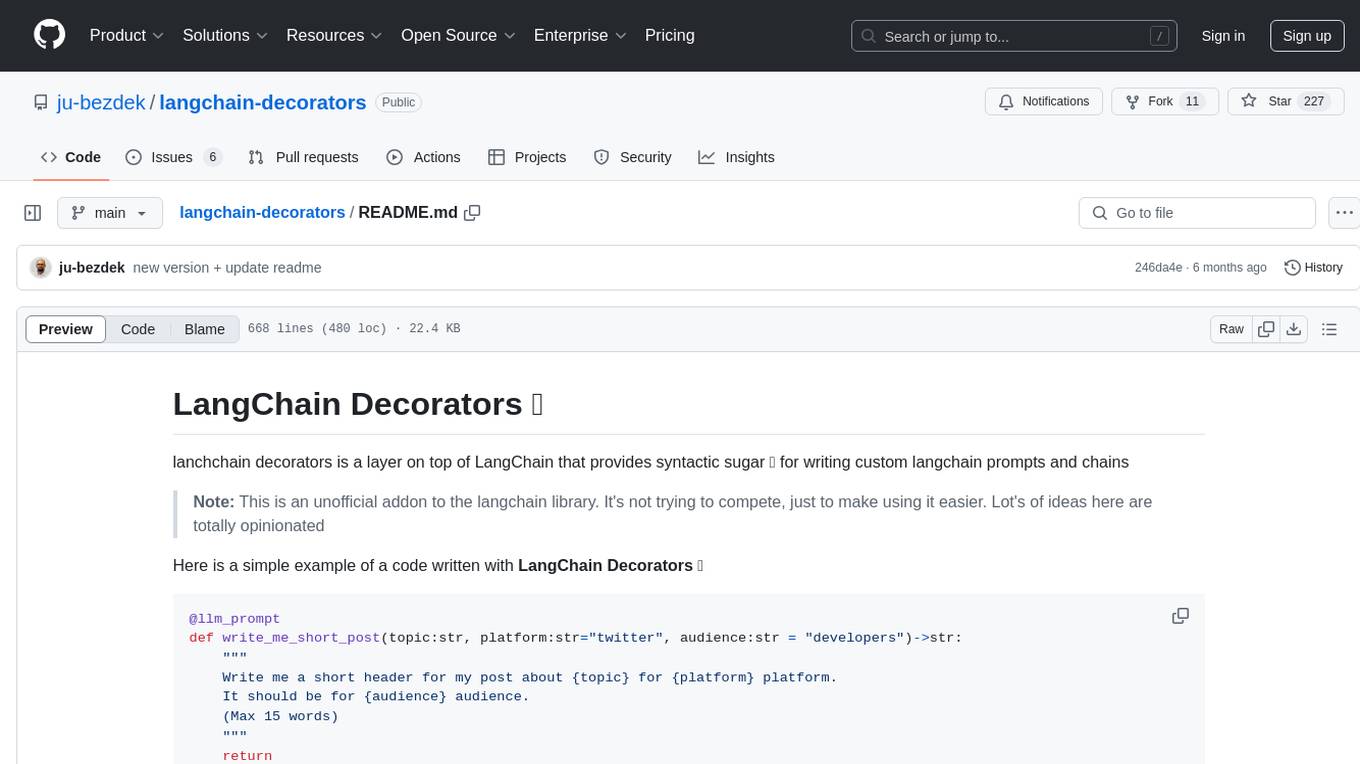
langchain-decorators
LangChain Decorators is a layer on top of LangChain that provides syntactic sugar for writing custom langchain prompts and chains. It offers a more pythonic way of writing code, multiline prompts without breaking code flow, IDE support for hinting and type checking, leveraging LangChain ecosystem, support for optional parameters, and sharing parameters between prompts. It simplifies streaming, automatic LLM selection, defining custom settings, debugging, and passing memory, callback, stop, etc. It also provides functions provider, dynamic function schemas, binding prompts to objects, defining custom settings, and debugging options. The project aims to enhance the LangChain library by making it easier to use and more efficient for writing custom prompts and chains.
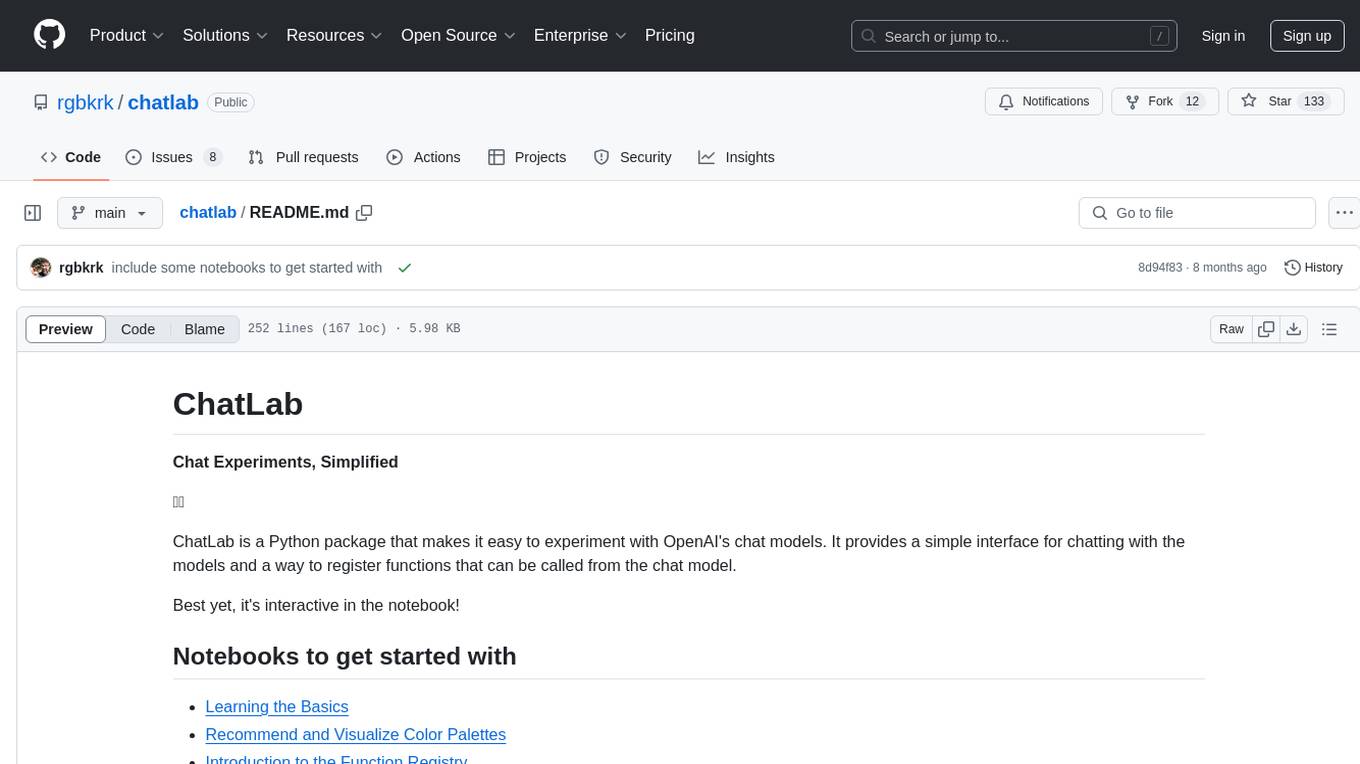
chatlab
ChatLab is a Python package that simplifies experimenting with OpenAI's chat models. It provides an interactive interface for chatting with the models and registering custom functions. Users can easily create chat experiments, visualize color palettes, work with function registry, create knowledge graphs, and perform direct parallel function calling. The tool enables users to interact with chat models and customize functionalities for various tasks.
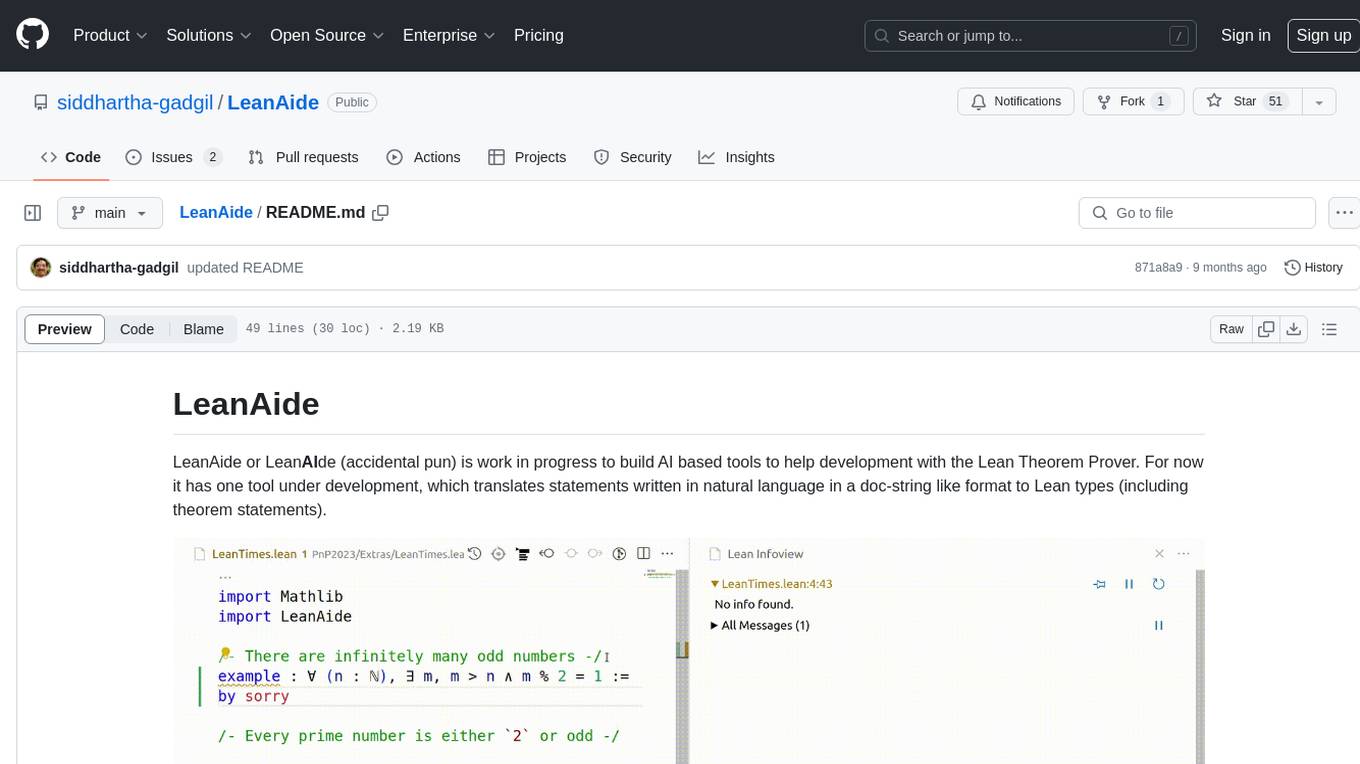
LeanAide
LeanAide is a work in progress AI tool designed to assist with development using the Lean Theorem Prover. It currently offers a tool that translates natural language statements to Lean types, including theorem statements. The tool is based on GPT 3.5-turbo/GPT 4 and requires an OpenAI key for usage. Users can include LeanAide as a dependency in their projects to access the translation functionality.
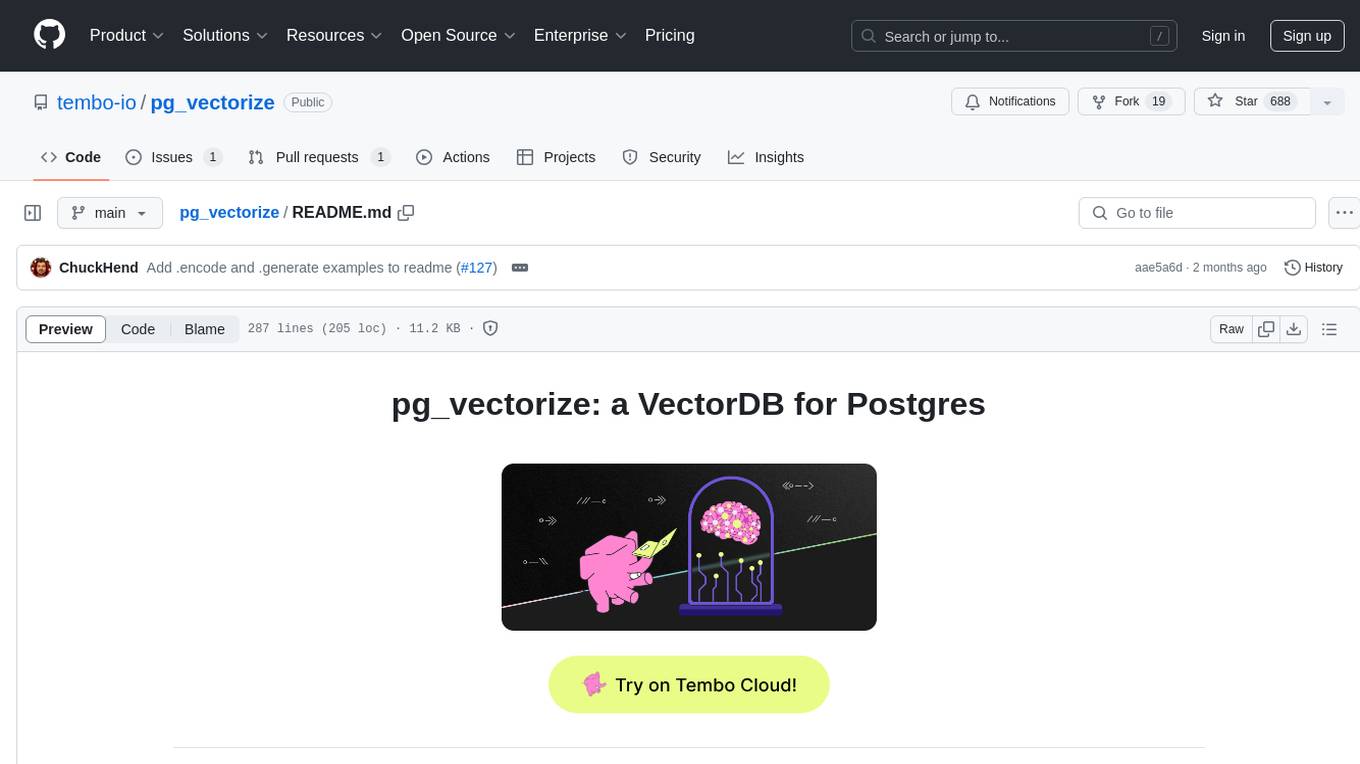
pg_vectorize
pg_vectorize is a Postgres extension that automates text to embeddings transformation, enabling vector search and LLM applications with minimal function calls. It integrates with popular LLMs, provides workflows for vector search and RAG, and automates Postgres triggers for updating embeddings. The tool is part of the VectorDB Stack on Tembo Cloud, offering high-level APIs for easy initialization and search.
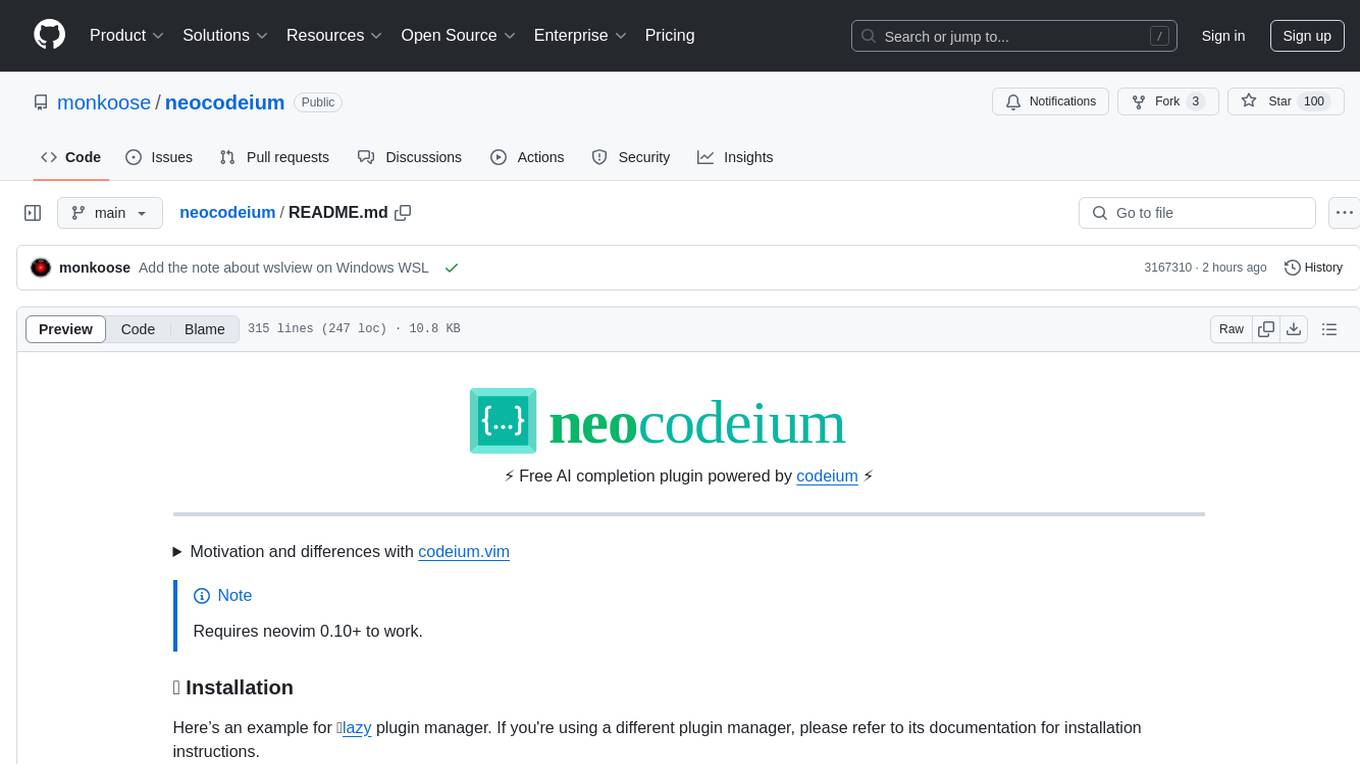
neocodeium
NeoCodeium is a free AI completion plugin powered by Codeium, designed for Neovim users. It aims to provide a smoother experience by eliminating flickering suggestions and allowing for repeatable completions using the `.` key. The plugin offers performance improvements through cache techniques, displays suggestion count labels, and supports Lua scripting. Users can customize keymaps, manage suggestions, and interact with the AI chat feature. NeoCodeium enhances code completion in Neovim, making it a valuable tool for developers seeking efficient coding assistance.
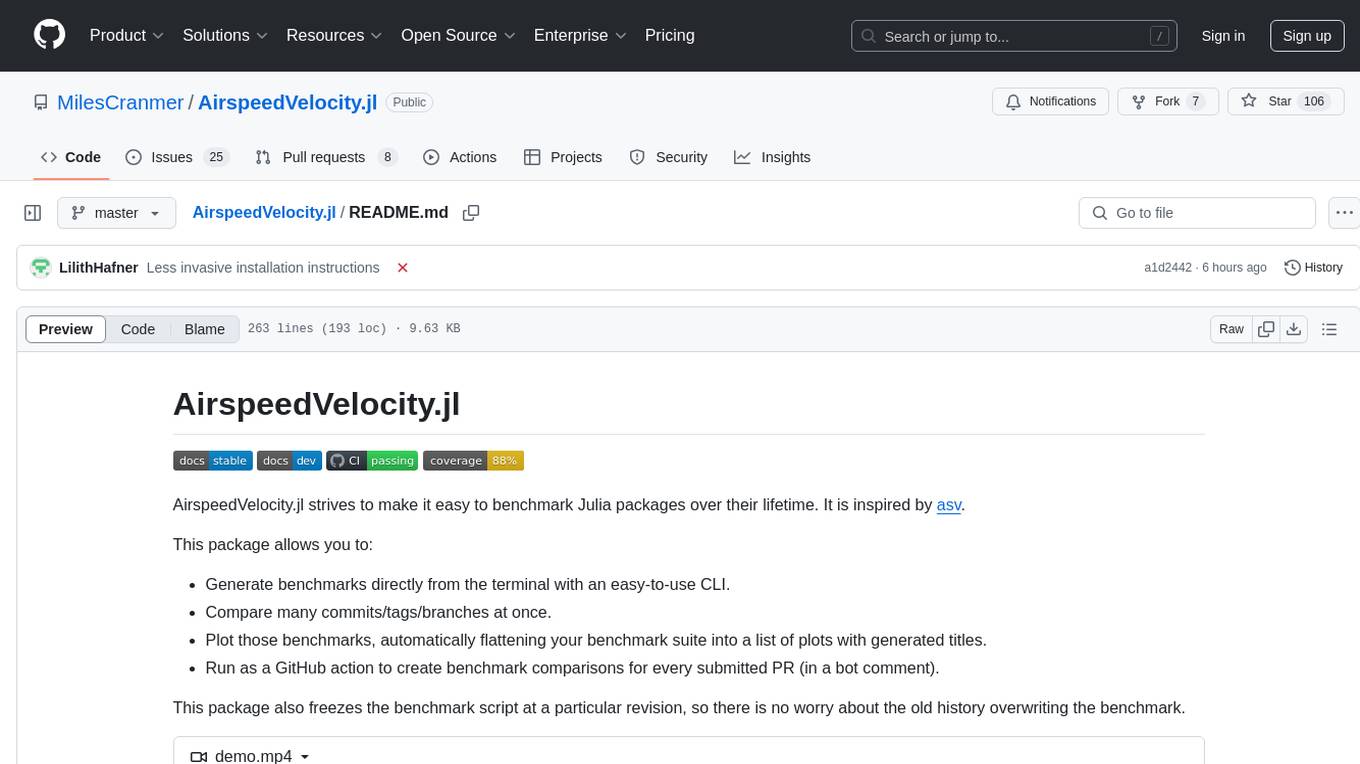
AirspeedVelocity.jl
AirspeedVelocity.jl is a tool designed to simplify benchmarking of Julia packages over their lifetime. It provides a CLI to generate benchmarks, compare commits/tags/branches, plot benchmarks, and run benchmark comparisons for every submitted PR as a GitHub action. The tool freezes the benchmark script at a specific revision to prevent old history from affecting benchmarks. Users can configure options using CLI flags and visualize benchmark results. AirspeedVelocity.jl can be used to benchmark any Julia package and offers features like generating tables and plots of benchmark results. It also supports custom benchmarks and can be integrated into GitHub actions for automated benchmarking of PRs.
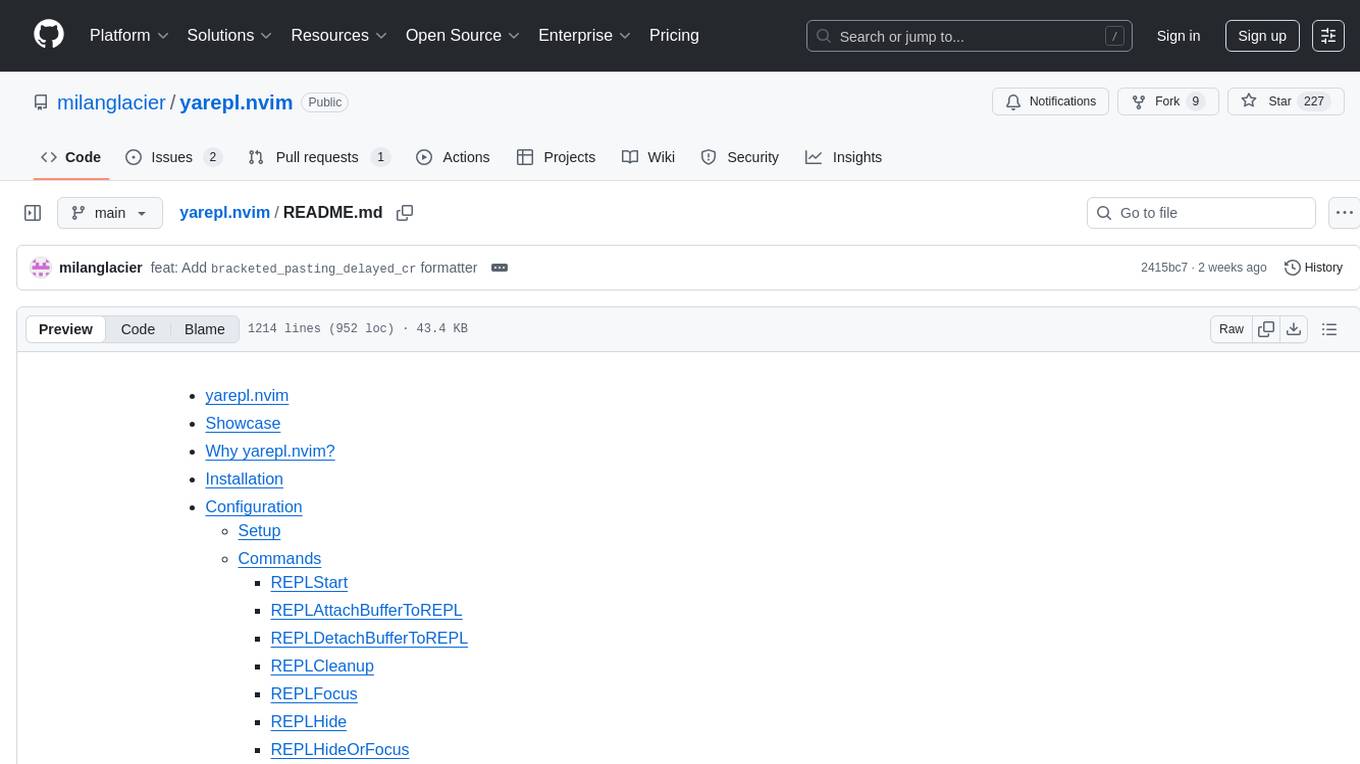
yarepl.nvim
Yet Another REPL is a flexible REPL / TUI App management tool that supports multiple paradigms for interacting with TUI Apps. This plugin allows users to effortlessly interact with multiple TUI Apps through various paradigms, such as sending text from multiple buffers to a single TUI App, sending text from a single buffer to multiple TUI Apps, and attaching a buffer to a dedicated TUI App. It features integration with aider.chat and OpenAI Codex CLI, as well as provides code cell text object definitions. Users can choose their preferred fuzzy finder among telescope, fzf-lua, or Snacks.picker to preview active REPLs. The plugin also supports project-level REPLs and creating persistent REPLs in tmux.
For similar tasks
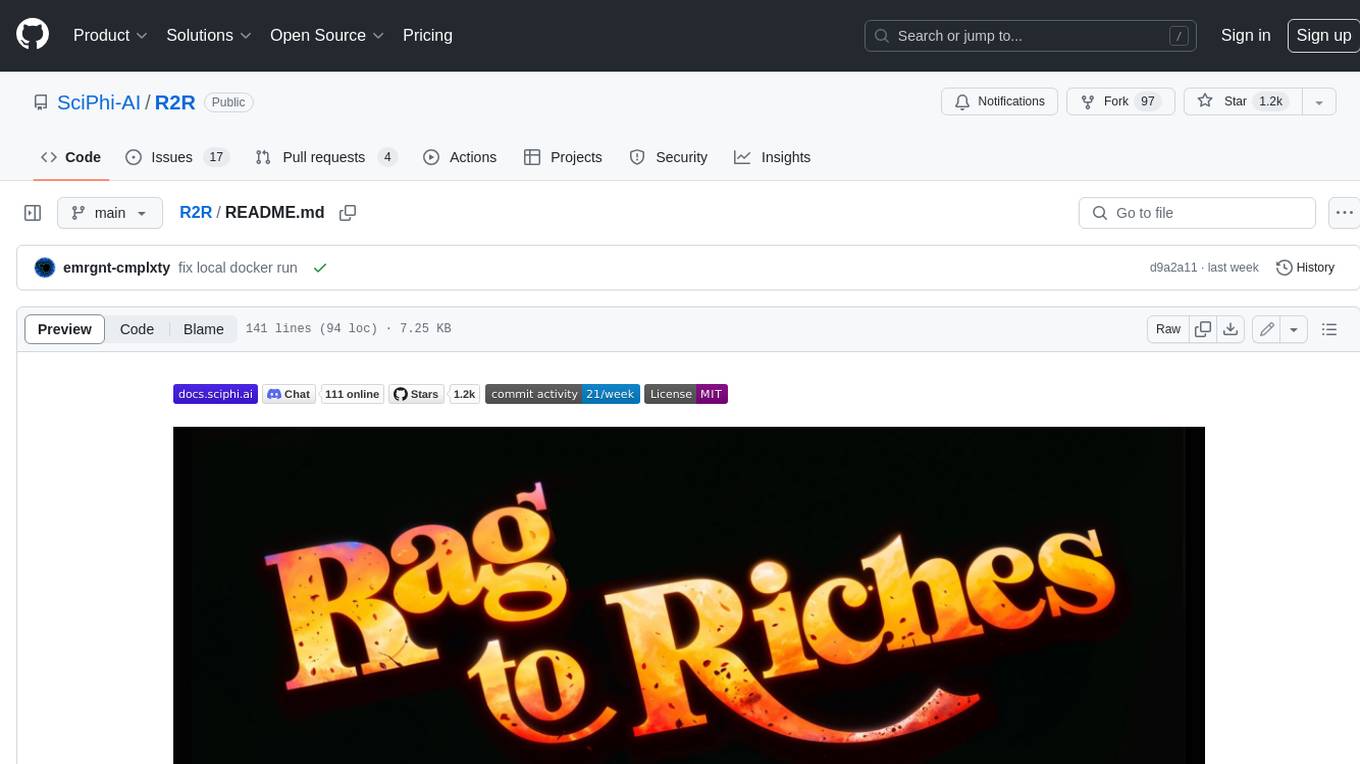
R2R
R2R (RAG to Riches) is a fast and efficient framework for serving high-quality Retrieval-Augmented Generation (RAG) to end users. The framework is designed with customizable pipelines and a feature-rich FastAPI implementation, enabling developers to quickly deploy and scale RAG-based applications. R2R was conceived to bridge the gap between local LLM experimentation and scalable production solutions. **R2R is to LangChain/LlamaIndex what NextJS is to React**. A JavaScript client for R2R deployments can be found here. ### Key Features * **🚀 Deploy** : Instantly launch production-ready RAG pipelines with streaming capabilities. * **🧩 Customize** : Tailor your pipeline with intuitive configuration files. * **🔌 Extend** : Enhance your pipeline with custom code integrations. * **⚖️ Autoscale** : Scale your pipeline effortlessly in the cloud using SciPhi. * **🤖 OSS** : Benefit from a framework developed by the open-source community, designed to simplify RAG deployment.
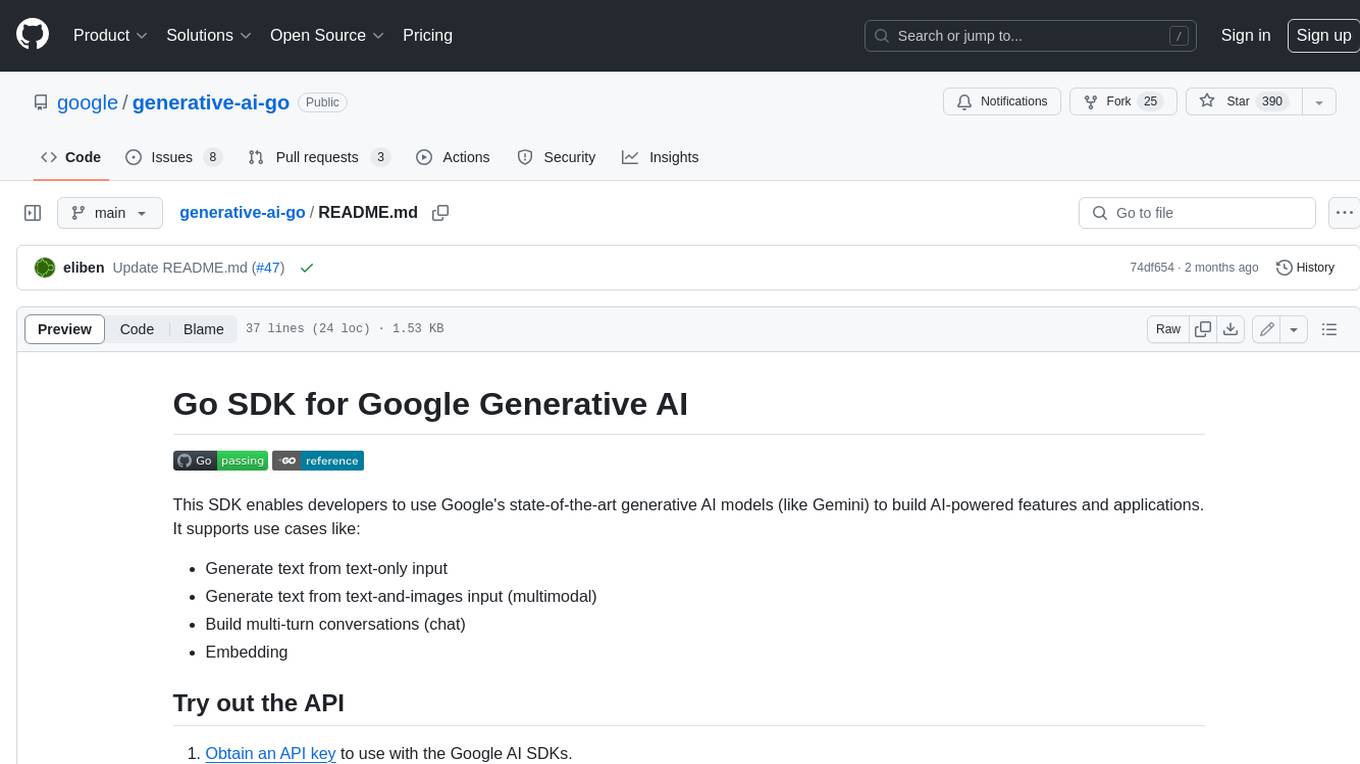
generative-ai-go
The Google AI Go SDK enables developers to use Google's state-of-the-art generative AI models (like Gemini) to build AI-powered features and applications. It supports use cases like generating text from text-only input, generating text from text-and-images input (multimodal), building multi-turn conversations (chat), and embedding.
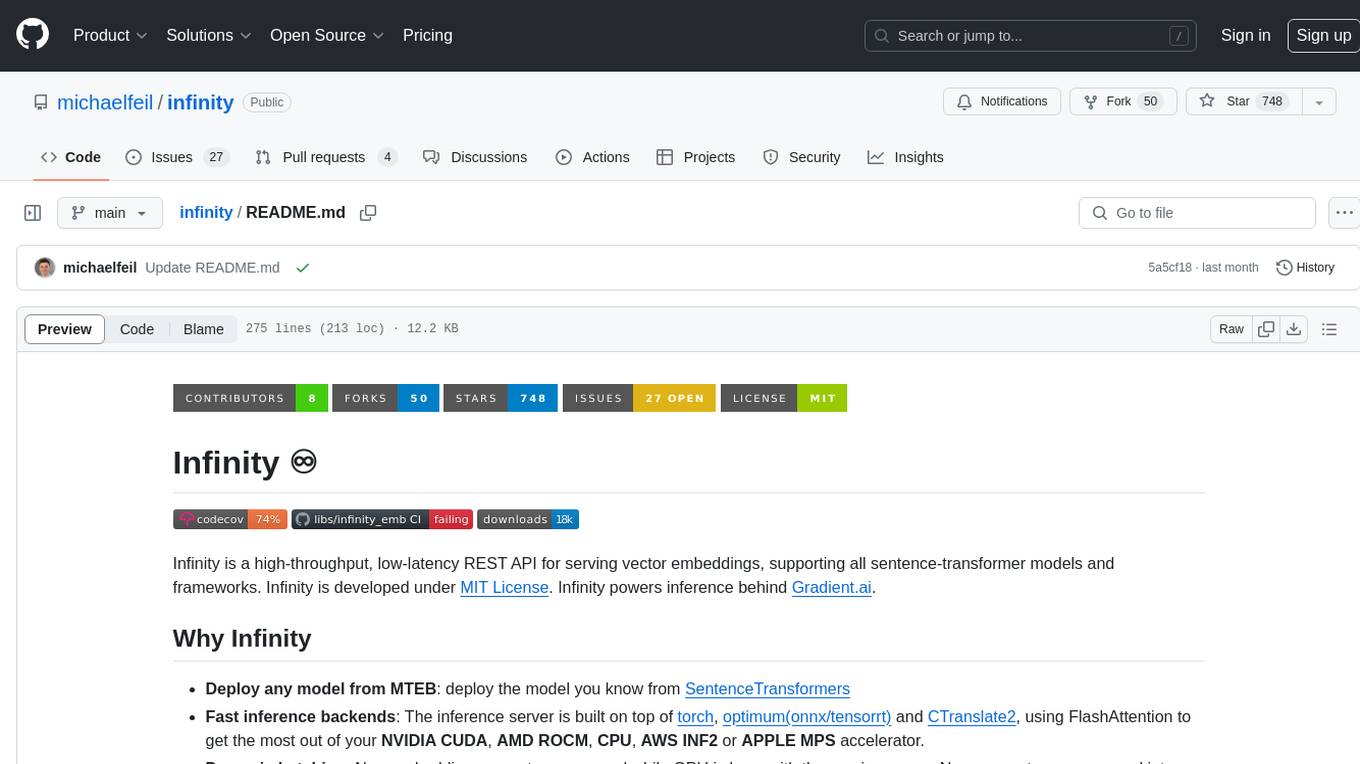
infinity
Infinity is a high-throughput, low-latency REST API for serving vector embeddings, supporting all sentence-transformer models and frameworks. It is developed under the MIT License and powers inference behind Gradient.ai. The API allows users to deploy models from SentenceTransformers, offers fast inference backends utilizing various accelerators, dynamic batching for efficient processing, correct and tested implementation, and easy-to-use API built on FastAPI with Swagger documentation. Users can embed text, rerank documents, and perform text classification tasks using the tool. Infinity supports various models from Huggingface and provides flexibility in deployment via CLI, Docker, Python API, and cloud services like dstack. The tool is suitable for tasks like embedding, reranking, and text classification.

godot-llm
Godot LLM is a plugin that enables the utilization of large language models (LLM) for generating content in games. It provides functionality for text generation, text embedding, multimodal text generation, and vector database management within the Godot game engine. The plugin supports features like Retrieval Augmented Generation (RAG) and integrates llama.cpp-based functionalities for text generation, embedding, and multimodal capabilities. It offers support for various platforms and allows users to experiment with LLM models in their game development projects.
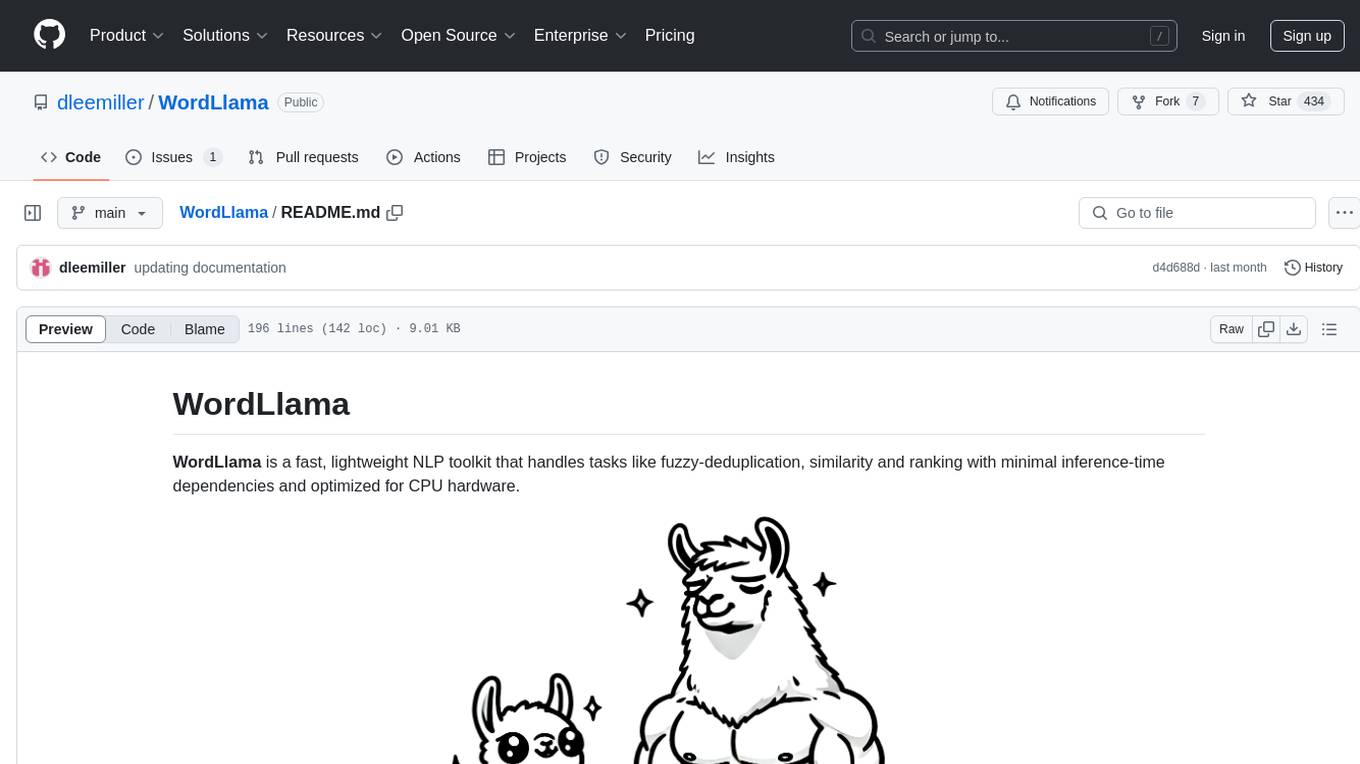
WordLlama
WordLlama is a fast, lightweight NLP toolkit optimized for CPU hardware. It recycles components from large language models to create efficient word representations. It offers features like Matryoshka Representations, low resource requirements, binarization, and numpy-only inference. The tool is suitable for tasks like semantic matching, fuzzy deduplication, ranking, and clustering, making it a good option for NLP-lite tasks and exploratory analysis.
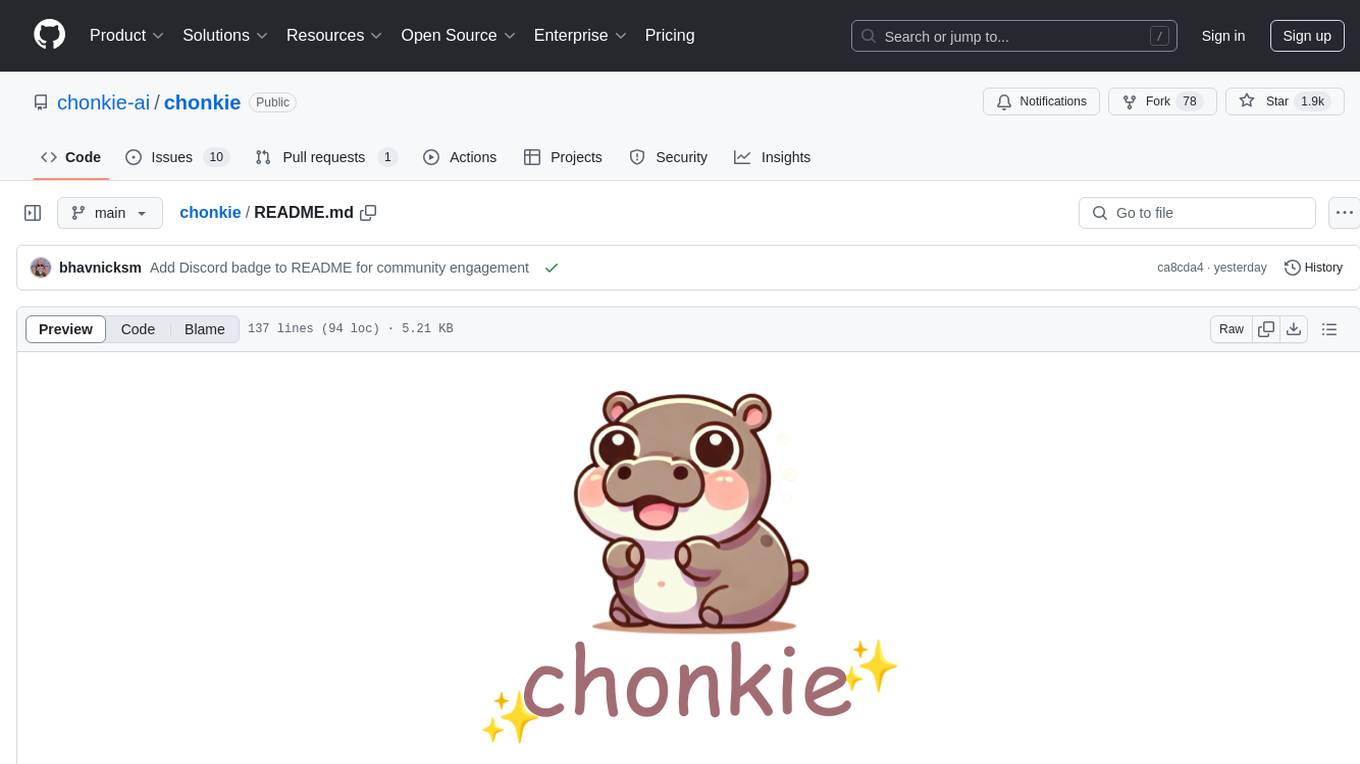
chonkie
Chonkie is a lightweight and fast RAG chunking library designed to efficiently split text for RAG (Retrieval-Augmented Generation) applications. It offers various chunking methods like TokenChunker, WordChunker, SentenceChunker, SemanticChunker, SDPMChunker, and an experimental LateChunker. Chonkie is feature-rich, easy to use, fast, supports multiple tokenizers, and comes with a cute pygmy hippo mascot. It aims to provide a no-nonsense solution for chunking text without the need to worry about dependencies or bloat.
For similar jobs

sweep
Sweep is an AI junior developer that turns bugs and feature requests into code changes. It automatically handles developer experience improvements like adding type hints and improving test coverage.

teams-ai
The Teams AI Library is a software development kit (SDK) that helps developers create bots that can interact with Teams and Microsoft 365 applications. It is built on top of the Bot Framework SDK and simplifies the process of developing bots that interact with Teams' artificial intelligence capabilities. The SDK is available for JavaScript/TypeScript, .NET, and Python.

ai-guide
This guide is dedicated to Large Language Models (LLMs) that you can run on your home computer. It assumes your PC is a lower-end, non-gaming setup.

classifai
Supercharge WordPress Content Workflows and Engagement with Artificial Intelligence. Tap into leading cloud-based services like OpenAI, Microsoft Azure AI, Google Gemini and IBM Watson to augment your WordPress-powered websites. Publish content faster while improving SEO performance and increasing audience engagement. ClassifAI integrates Artificial Intelligence and Machine Learning technologies to lighten your workload and eliminate tedious tasks, giving you more time to create original content that matters.

chatbot-ui
Chatbot UI is an open-source AI chat app that allows users to create and deploy their own AI chatbots. It is easy to use and can be customized to fit any need. Chatbot UI is perfect for businesses, developers, and anyone who wants to create a chatbot.

BricksLLM
BricksLLM is a cloud native AI gateway written in Go. Currently, it provides native support for OpenAI, Anthropic, Azure OpenAI and vLLM. BricksLLM aims to provide enterprise level infrastructure that can power any LLM production use cases. Here are some use cases for BricksLLM: * Set LLM usage limits for users on different pricing tiers * Track LLM usage on a per user and per organization basis * Block or redact requests containing PIIs * Improve LLM reliability with failovers, retries and caching * Distribute API keys with rate limits and cost limits for internal development/production use cases * Distribute API keys with rate limits and cost limits for students

uAgents
uAgents is a Python library developed by Fetch.ai that allows for the creation of autonomous AI agents. These agents can perform various tasks on a schedule or take action on various events. uAgents are easy to create and manage, and they are connected to a fast-growing network of other uAgents. They are also secure, with cryptographically secured messages and wallets.

griptape
Griptape is a modular Python framework for building AI-powered applications that securely connect to your enterprise data and APIs. It offers developers the ability to maintain control and flexibility at every step. Griptape's core components include Structures (Agents, Pipelines, and Workflows), Tasks, Tools, Memory (Conversation Memory, Task Memory, and Meta Memory), Drivers (Prompt and Embedding Drivers, Vector Store Drivers, Image Generation Drivers, Image Query Drivers, SQL Drivers, Web Scraper Drivers, and Conversation Memory Drivers), Engines (Query Engines, Extraction Engines, Summary Engines, Image Generation Engines, and Image Query Engines), and additional components (Rulesets, Loaders, Artifacts, Chunkers, and Tokenizers). Griptape enables developers to create AI-powered applications with ease and efficiency.
